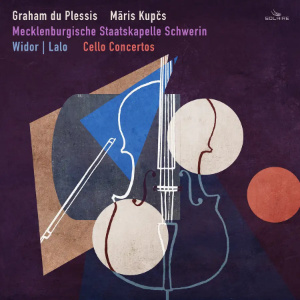
Charles-Marie Widor (1844-1937)
Cello Concerto in E minor, Op. 41 (ca. 1882)
Éduardo Lalo (1823-1892)
Cello Concerto in D minor (1876)
Graham du Plessis (cello)
Mecklenburgische Staatskapelle Schwerin/Māris Kupčs
rec. 2023, Marstall, Schwerin, Germany
Solaire SOL1019 [59]
Most of us can be excused for not knowing that Charles-Marie Widor, that great French composer of monumental organ symphonies, had ever written a cello concerto. Graham du Plessis lays out the remarkable history behind this recording in the notes for this release, which bears the fruits of a labour of love in producing a new edition derived from a variety of sources including Widor’s original manuscript. In summary, the present recording differs in a number of aspects from a known cello-piano reduction; the version apparently was used for this work‘s CD premiere from 2012 on the Dutton label with Torleif Thedéen and the Royal Scottish National Orchestra conducted by Martin Yates (CDLX7303).
Du Plessis points out a few passages in which this concerto might be compared to Widor’s organ music in its orchestration or treatment of the solo line, but I suspect that few people hearing this ‘blind’ would name Widor as its composer. For sure the late Romantic idiom is very much of his period, but as the sprightly and joyous Allegro first movement progresses there is hardly anything that brings the organ to mind, at least to my ears. Widor’s compositional technique and the sonorities in this work are Germanic at a macro scale, more French in the details. I hear Beethoven in the first movement, Bruckner in the sustained notes of the opening of the Andante second movement, perhaps Mahler later on in those pizzicato bass and harp colours, and the spirits of Schumann and Mendelssohn certainly seem present in the finale.
Du Plessis mentions a “type of quasi recitative motivic development” that is very French, with the concerto as a whole being “very ‘cellistic’ in character; much is introverted and understated with some declamatory mostly interspersed with very expressive material.” With music from the first movement appearing in the Allegro vivace finale there is a cyclical feel to the work which points to the likes of César Franck, and one can feel Widor attempting a comparable quality to his melodic themes without quite reaching Franck’s level of lyrical and harmonic memorability. With perhaps a few minutes of excess baggage in the last movement this is in general an excellent cello concerto and a ‘classic’ Romantic period piece, so it would make a nice change to see it appearing in future concert programmes, even though its serene final moments might not help its popularity as a typical showpiece.
Éduardo Lalo’s Cello Concerto in D minor is by contrast a well-known and regularly performed and recorded work, and this is a very fine performance. This is one of those concertos a recording of which you might select on the strength of the couplings on the CD, which are many and varied, ranging from Dvořák to Saint-Saëns and plenty more besides. I picked Jan Vogler’s recent recording on Sony Classical 19658801582 (review), which appears alongside another less well-known concerto by Enrique Casals. There is little to be learned from the timings, with Du Plessis marginally longer in the outer movements but by no means to any extreme. Vogler is recorded in the big acoustic of Dresden’s Lukaskirche, and this is something of a defining feature of the production, giving the music a grander and more monumental feel to the comparably intimate sound from Schwerin. The latter is by no means small-scale, with plenty of dynamic heft from the orchestra, but which you prefer will be down to a matter of taste. Both orchestras are first-rate, and both recordings raise the soloist in the balance but without creating a wall-of-cello sound that obscures the orchestra much beyond what you might expect from a concert experience. The only negative I have with the present orchestral sound is that the timpani are a touch on the boomy side, which may be an effect of the acoustic or the instruments used. The results will also depend on what kind of equipment you use for listening.
We are talking about small margins and I would be happy with either version, but Vogler is a bit more varied in his expressive contrasts, a touch more turbulent and ‘operatic’ in his approach. Du Plessis is more restrained but still with a wealth of subtleties in terms of expressive vocabulary, and no lack of contrast in terms of colours, dynamics and articulation. Again, this comes back to personal taste, and in an ideal word you would have both of these recordings and more, picking out the one which suits your mood of the moment. Either way, Graham du Plessis and the Mecklenburgische Staatskapelle Schwerin under Māris Kupčs are good enough for me, and discovering the Widor concerto is the main focus here.
Dominy Clements
Buying this recording via the link below generates revenue for MWI, which helps the site remain free


















